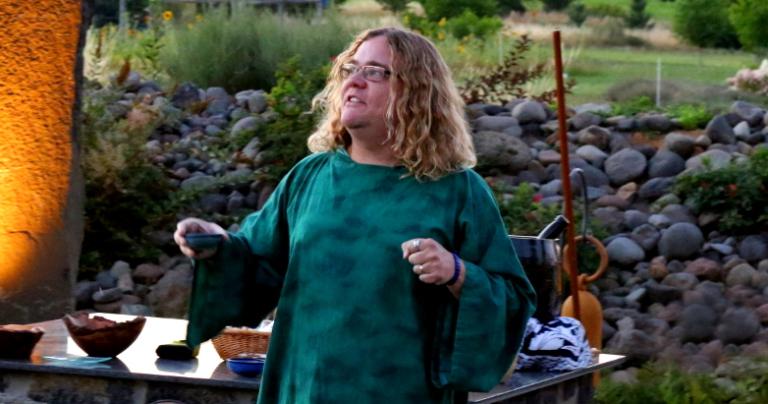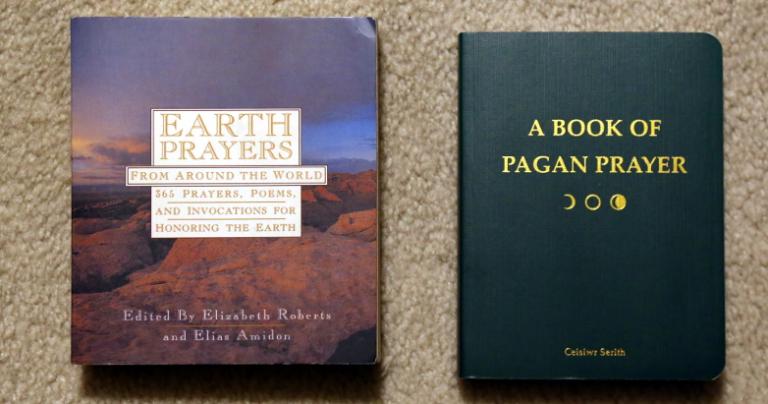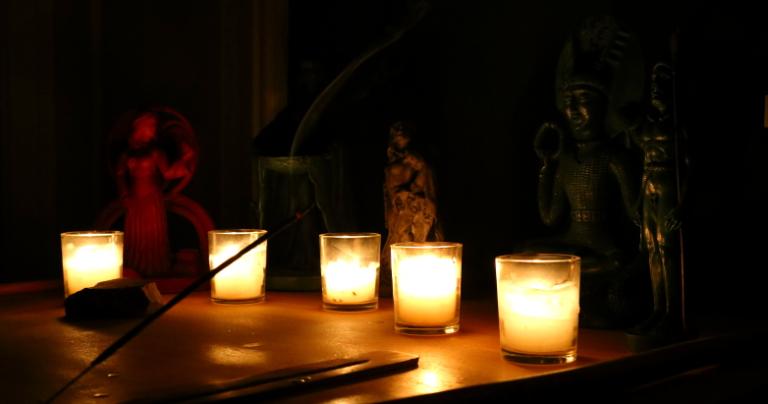The questions for the first Conversations Under the Oaks included several on prayer. Here’s one that’s fairly typical.
What is your opinion on the importance of prayer in Paganism? What style of prayer do you use with your Gods – formal / recited, or more casual / conversational?
I’ve been wanting to integrate more prayer into my practice. But as someone who grew up Christian, I have a bit of a broken relationship with prayer itself.
Many – perhaps most – Pagans have a broken relationship with prayer. We were forced to pray as kids. We suffered through long and boring prayers in church and before meals. Some people tell us prayer is the answer to everything, while others tell us prayer accomplishes nothing. And we all know people (some Christian and some Pagan) whose prayers resemble a four-year-old’s Christmas list. It’s enough to turn us off on the practice of prayer.
And that’s a shame, because prayer is one of the most basic and most helpful spiritual practices in virtually every religion.
Here are some previous posts on prayer:
The Power of Prayer – the benefits of prayer.
Iamblichus on Prayer – the thoughts of the Neoplatonist Iamblichus, writing around 300 CE.
Pagan Prayer Beads – jealous of your Catholic friends’ rosaries? Need an aid for regular prayers? Prayer beads are used in many religions.
Prayer is talking to the Gods
For all the rules and mystery around prayer, it’s a very simple thing: prayer is talking to the Gods. Paganism is a religion (or religions, if you prefer) of relationships, and healthy relationships require constant communication. That’s why meditation (specifically, the kind of meditation that focuses on listening) is also important – we don’t want to monopolize the conversation.
The purpose of prayer is not persuade the Gods to give us stuff, and it’s not reinforce fragile egos with constant praise. The Gods know They’re Gods – They don’t need us to remind Them of that. We, on the other hand, often need to remind ourselves that while we are sacred beings of inherent value and worth, the Gods are Gods and we are not.
Like conversations with friends and family, our conversations with the Gods draw us closer to Them. It reminds us to listen for Their presence, and to keep Their virtues and values foremost in our lives.
Scripted or extemporaneous
Some prayers are very formal and carefully scripted. They often follow a prescribed formula, such as invocation – praise – request. If you come across ancient prayers they are almost certainly scripted, because unscripted prayers are rarely written down.
If you’re going to use a prayer over and over again, or if you’re going to use it in a public ritual, it makes good sense to write it carefully. Make sure it says exactly what you want it to say. Make sure it flows and that it’s grammatically correct. Or if it’s not, that you’re breaking grammar rules on purpose and not from ignorance or carelessness. Make sure it doesn’t mindlessly copy the language or format of the prayers of another religion.
If you’re speaking to your Gods on behalf of a gathering, make your prayer as good as you can get it.
Other prayers are more conversational – we speak to the Gods as we might speak to someone standing bodily in front of us. Perhaps we have a great need and so we describe it in detail. Perhaps we want to negotiate the terms of an agreement – we need to clearly delineate what we will do and what we won’t. Or perhaps we want to express the yearnings of our hearts. And so we just speak.
Of my four daily prayers, two are entirely scripted. The other two are partially scripted, with places for conversational prayer. My ritual prayers are always scripted.

Content of prayers
What do you say in prayer?
Invocation is calling a God and asking Them to hear your prayer. It is common to address a deity by multiple epithets. Part of this is to make it perfectly clear who you’re talking to. But another part is so you remember who you’re talking to. They know They’re Gods. We sometimes forget, often aided by those who do not want to accept that humans are not the greatest power in the Universe.
Praise is recounting Their virtues and Their great deeds. Few if any of the Many Gods are insecure and need – or want – to be propped up by sycophants. But by praising the Gods we are reminded of what is truly praiseworthy, and thus how we can best live our lives.
Thanksgiving. If the Gods have been generous to you, say thank you. If They granted your request, say thank you. If They declined to grant your request and you realize They did you a big favor because you asked for something you didn’t really want, say thank you.
There are many things we enjoy that we did not earn. The least we can do is express our gratitude.
Devotion. This is one of the ways we build close relationships with deities – by talking to Them in prayer. Which of Their virtues do you most admire? Say it. What did They do for you that you really appreciate? Say it.
How would you talk to your grandmother or to a favorite uncle? What would you say if a social or political leader you admire came to visit you? The Gods are more than any of these things, and it is best to approach even familiar deities with reverence, but expressions of devotion and love are always appropriate.
Requests. The Gods are persons, not vending machines where you insert offerings and blessings fall out. I still see some Pagans who have no qualms about approaching a deity they’ve never met and asking for huge favors. That works about as well as when a stranger walks up to you and asks for a substantial gift.
Still, if you need something, ask for it. If you have a relationship with a deity, they’re more likely to help you out of a difficult situation – particularly if you need something to be able to accomplish a task they’ve set in front of you. It is always good to ask for healing for yourself and your loved ones.
Remember that the world runs on reciprocity. If a God grants your request, They may later ask you for something in return – that’s how my relationship with the Morrigan began.
The desires of your heart. While we all want to avoid sounding like a kid sitting on Santa Claus’s lap, there is nothing wrong with speaking the desires of your heart to the Gods. What is it you want most? What is it you value most? What calls to you, perhaps softly and perhaps with a screaming voice?
Say it. Tell the deities with whom you are acquainted how you feel.
And then listen for Their response.
Who do you pray to?
I speak of “the Gods” in this post, but as a polytheist I never pray to Them collectively. I am a priest of Cernunnos and Danu, a Druid of the Morrigan, and a devotee of Brighid and Lugh. I pray to all of Them daily. I pray to Cernunnos and to the Morrigan as part of the weekly devotions They have each requested of me.
I pray to Ma’at daily, both as a representative of the Neteru as a whole (with whom I have an unusual but longstanding relationship) and as a Goddess of Justice and Order.
I have looser relationships with numerous other deities. If the Gods listed above are family who live in my house or perhaps down the street, these are the relatives who live far away that I see once or twice a year. I pray to Them on occasion.
When Denton CUUPS is preparing a ritual, I will pray to the Deities of the Occasion whether I know Them or not. I occasionally pray to unknown deities on behalf of a friend who follows Them.
Having said all that, if you don’t know who to pray to, just pray. And then listen.
Prayer as a regular practice
A Methodist minister once told me most people he counseled treat prayer like a spare tire. They keep it locked in the trunk of their car and ignore it until they have an emergency. Then they dig it out and hope it has enough air in it to get them home.
Like all spiritual practices, prayer works best when you work at it on a regular basis. Write or find a prayer you can say every day at the same time. It doesn’t have to be long – in many ways it’s better if it isn’t. My morning prayers are extremely short, because getting up in the morning is hard enough as it is.
And then make a commitment to pray that prayer every day. If you forget one day, pick it up again the next day. If you need reminders or prompts, prayer beads work very well.
I will close with these words from Iamblichus:
It remains, therefore, at the end of this discourse, for me to pray to the gods to grant both to me and to you the unalterable preservation of true thoughts, to implant in us the truth of eternal things forever, and to grand to us a participation in the more perfect conceptions of the gods in which the most blessed end of good things is placed before us, along with the sanction of the harmonious friendship between us.
May it be so.


















